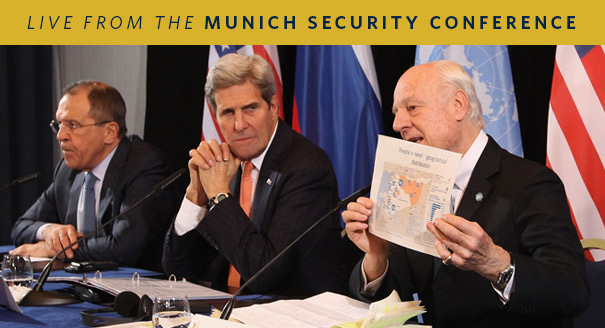Carnegie Europe was on the ground at the 2016 Munich Security Conference, offering readers exclusive access to the debates as they unfolded and providing insights on today’s most urgent international issues. Check out our live coverage here.
*
On the second day of the 2016 Munich Security Conference, the pace of proceedings visibly accelerated. In just four short hours on the morning of February 13, four presidents (of Ukraine, Finland, Lithuania, and Poland), two prime ministers (of Russia and France), four foreign ministers (of Germany, Russia, the United States, and the United Kingdom), and the president of the European Parliament spoke during the part of the conference that mattered most.
There is a reason for this. The war in Syria is now a proxy theater for the struggle over world order. Most see the refugee crisis as worrisomely grave but essentially a regional issue. Many people are very concerned about the future of European Union, but even more people are even more concerned about what kind of world will emerge from the charged conflict in the Levant.
Status, influence, and prestige of too many players are at stake in Syria. Compared with the relatively small number of victims of the refugee crisis, Syria is a veritable slaughterhouse. For Russia, cutting a strong figure in Syria is crucial for its ambition to demonstrate its status as a world power. Likewise, much of the United States’ credibility as the leader of the free world depends on whether U.S. diplomacy can make a difference. Countries and players around the world are closely observing how America decides to bring its powers to bear.
For the Middle East, Syria is the lab from which recipes of regional order will emerge. Iran and Saudi Arabia are testing their competing powers, religious appeals, and alliances. For countries such as Jordan and Lebanon, which have taken in huge numbers of Syrian refugees, the outcome of the Syrian conflict is a question of national survival. And the war in Syria is also about whether an antimodern, religiously gung-ho death cult aspiring to bring about world revolution will be allowed to control significant territory, run state-like entities, and spread murder and mayhem across the globe.
This is why the February 11 statement by the International Syria Support Group, which consists of 17 countries and three organizations, was of such significance, no matter how thin it was. It has become clear that the war in Syria is too costly for everyone, only that not enough of the players involved are willing yet to write off some of their investments to avoid bigger losses in the future. But it is graspable that the moment at which that can happen is coming closer. The Munich Security Conference is hypercharged with that sentiment. The big question is how many more people will have to die in Syria before the moment arrives.
The other big issue in Munich, although not on the agenda in its own right, is Russia. Both Prime Minister Dmitry Medvedev and Foreign Minister Sergei Lavrov gave long speeches at the podium, but none of what they had to say was particularly new or surprising. The Russian mix of idiosyncratic worldview, twisting of reality, valuable analysis, and shameless propaganda is well-known by now to audiences around the world.
Medvedev peppered his act with careful infusions of rhetorical lament and regret about all the missed chances for better cooperation, but he also made clear that all of the mistakes had been made by others, and none by Russia. Lavrov, true to his usual role, was the emotionless robot, reinforcing Medvedev’s message with admirable straight-facedness. They survived a short magic moment in which they were openly confronted by the audience on some of the brutal contradictions in their words and policies, and then they were gone. They left the stage to a visibly emotional and enervated Petro Poroshenko, president of Ukraine, who was forced to defend his record in office and had none of the sovereign coolness of his Russian counterparts.
Everyone capable of taking a step back and looking beyond the political chess game being performed could also see something else play: the slow burning Russian tragedy of the early twenty-first century. A great power mired in a self-destructive downward spiral of historical complexes, hurt pride, a culture of victimhood, postimperial maladjustment, a false sense of threat, and lies that beget lies. One dares not think about what this great power could achieve if it could bring its enormous talent, grit, and ingenuity to produce something useful.
A final word on the United States. Just as during the first conference day, the United States played only a marginal role in the main debates on day two. Not even NATO Secretary General Jens Stoltenberg made a reference to the alliance’s key player. Three hours into the proceedings, U.S. Secretary of State John Kerry gave a strong speech, and he sold the U.S. commitment to Europe quite well. He also tried to explain the relevance of President Barack Obama’s decision to increase U.S. defense spending in Europe by a factor of four, a topic that needs a lot more discussion given its significant political and military impact.
But Kerry’s performance seemed oddly disconnected from the rest of the conference, which, after he finished, went straight back to where it was before: discussions in which the United States was not even mentioned. Perhaps the evening session about the future of NATO will produce more of a transatlantic element. But for everyone convinced of the crucial role the United States plays for security and stability in Europe, a strange aftertaste remains.








